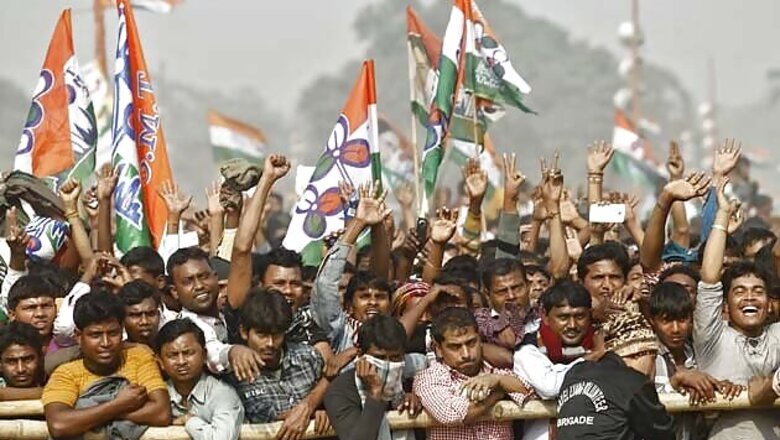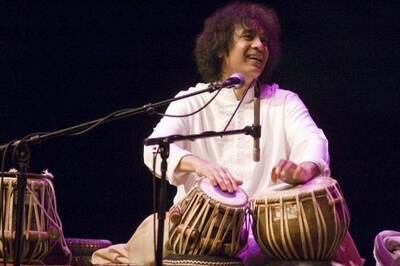
views
"None of the previous equations would work. The political winds of Bengal are blowing in a different direction this time and I assure you it wouldn't be a cake walk for the Trinamool Congress," said an emphatic Rahul Sinha, the president of the BJP's West Bengal unit and a candidate in the North Kolkata seat which is gearing up to witness one of the most high-profile and closely-fought four-cornered electoral battles of the state.
In 2009, the BJP candidate from this seat, Tathagata Roy, came a distant third by acquiring merely a little over 4 per cent votes. The fight was mainly between Trinamool Congress's Sudip Bandyopadhyay and CPI-M's Mohammad Salim with the former emerging victorious with a margin of over 1 lakh votes and a vote share of more than 52 per cent.
A look at the 2011 Assembly poll figures and things appear even sunnier for the Trinamool Congress with the party having won all seven Assembly seats with comprehensive margins over its nearest rival, the Left.
Yet Mamata Banerjee and her trusted lieutenant Bandyopadhyay look ill-at-ease even though the incumbent MP from this seat has for his prime challenger, CPI-M's Rupa Bagchi, who was herself defeated by the Trinamool from Maniktala, one of the Assembly segments under the North Kolkata constituency in 2011.
That discomfiture is perhaps because, besides the growing influence of the BJP here, of the fact that Bandyopadhyay is additionally having to take on another political heavy weight, Somen Mitra of the Congress. It's ironic that Mitra was Bandyopadhyay's colleague in the Lok Sabha for the better part of the UPA 2 regime before the latter got disillusioned with Mamata and returned to his original cradle, the Congress.
Bandyopadhyay knows that Mitra, with whom he fought shoulder to shoulder on the floor of Parliament on issues concerning the Trinamool Congress, still exerts considerable influence in this locality and could become the biggest road block to his political ambitions. At least in 2009, Bandyopadhyay did not have to bother about the Congress vote bank from this region since the two parties had forged an alliance.
"My voters know what to speak, where to speak and when to speak," said a confident-looking Mitra when I caught up with him during one of his road shows.
"We want a corruption-free government at the Centre and a government which will cater to the aspirations of the youth in a city like Kolkata without calculating its political benefits," said Soumalya Mukhopadhyay, a student of Presidency University. Soumalya was one of the organisers of an unprecedented referendum at the university where students voted against Professor Sugata Bose's membership at the institution's governing council after he decided to fight the elections from Jadavpur with a Trinamool Congress ticket.
Similar sentiments were conveyed by Anasua Banerjee, a budding media professional, when I struck a conversation with her at a road-side tea stall in South Kolkata. "It baffles me why, even after so many governments having come and gone, opportunities don't seem to have increased for the youth. It is unfortunate that we still have to consider migrating to Mumbai or Bangalore for some specialised higher studies or jobs," she regretted while quietly sipping tea with her friends.
Considered to be the more developed part of the city, South Kolkata is not without its share of woes: where high rises and slums cohabit, where some vital infrastructure projects are taking ages to complete, where infrastructure is barely sufficient to cater to the ever-growing population pressure on this city.
Yet CPI-M's Nandini Mukherjee, a teacher at Jadavpur University and the prime rival to the incumbent MP from South Kolkata, Trinamool Congress's Subrata Bakshi, feels that the larger political issues like price rise and women's security can swing the tide once again in favour of the Left. I was talking to her during one of her door-to-door campaigns which looked to be in sharp contrast to the grand meetings and road shows which her formidable rival was putting up. It's worth a mention that Mukherjee was no match for the Trinamool Supremo Mamata Banerjee during the 2011 Assembly bypolls from the Bhowanipore seat, a part of the Kolkata South Lok Sabha constituency.
Interestingly, the Aam Admi Party, too, has fielded its lone candidate in Bengal in this seat although very little is visible of the stock market professional and social worker Mudar Patherya, at least on the surface.
The battle looks promising even in the constituencies bordering both the northern and southern extents of Kolkata - constituencies which are also an integral part of this city.
In Dum Dum, in the northern fringes of Kolkata the primary fight is between two former teachers: TMC MP Saugata Roy and rival CPI-M candidate and former finance minister of the state Asim Dasgupta. However, a re-energised BJP which is known to have significant following in the region can upset poll calculations for Roy who won by a narrow margin over his nearest CPI-M rival in 2009. After all, Tapan Sikdar, the BJP candidate from this seat, had won from here twice: in 1998 and 1999.
Comparatively, however, poll equations look fairly simple in Jadavpur in the southern fringes of Kolkata where the contest is mainly two-way between TMC's Sugata Bose, a Harvard University professor and grand nephew of Netaji Subhas Bose, and senior CPI-M leader Sujan Chakraborty. Although Trinamool Congress secured a leading margin of nearly 60,000 votes five years ago, the party's MP and singer Kabir Suman later turned out to be one of the severest critics of Mamata Banerjee and her policies. Evidently, Banerjee hopes to have a more obedient MP out of Bose this time if he makes it past his main rival.
The fifth and final phase happens to be the most crucial phase of polling in West Bengal when the electors of 17 constituencies, including those in Kolkata, exercise their right to franchise on Monday, May 12. Needless to say, the stakes are highest for Mamata Banerjee. Of the 17 seats in poll fray, the TMC had won 16 in 2009 and Banerjee would be desperate to hold on to that tally this time around as well in order to reach her desired target of 30 seats or thereabouts from the state. But with the Supreme Court verdict of handing over the Saradha ponzi scam probe to the CBI coming barely 72-hours ahead of the D-day, the spectre of corruption has returned to haunt the party. Banerjee and her lieutenants may have successfully buried the hatchet ahead of the Panchayat polls in 2013 when the scam broke out but the latest developments may well end up becoming the biggest thorn in her flesh.




















Comments
0 comment